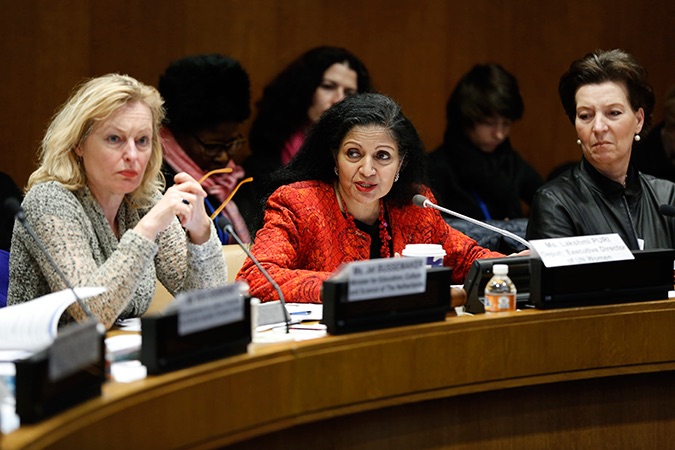“We need to respond to violence against women and girls as a matter of urgency”—Deputy Executive Director Lakshmi Puri
Remarks by UN Women Deputy Executive Director Lakshmi Puri at the CSW60 side event “Eradicating All Forms of Violence against Women and Girls: Why it Matters for Sustainable Development”, United Nations Headquarters, 15 March 2016.Date:

[Check against delivery]
Excellencies,
Distinguished colleagues from civil society and the United Nations,
Ladies and gentlemen,
I have just come from presenting the report of the review theme on violence against women where I stated that this theme is of paramount importance to the gender equality, women’s empowerment and the women's human rights agenda and its achievement.
The panel today comes at a time of unprecedented political and normative commitment to the elimination of violence against women and to the achievement of gender equality and the empowerment of women.
The 2030 Agenda in paragraph 20 makes an overarching commitment to ending violence and discrimination and within SDG 5, it includes specific targets on the elimination of violence against women. This is a huge paradigm shift. With the 2030 Agenda, the elimination of violence against women is not only about gender equality, but a sustainable development objective which targets all countries. At the Global Leaders’ Commitments Meeting, 70 per cent of the 72 Heads of State made specific commitments on the elimination of violence against women.
We all know that violence negatively affects women’s and girls’ physical, mental, sexual and reproductive health, including increasing their risk of contracting HIV. It can reduce educational attainment and productivity. It stops women and girls from fulfilling their true potential and it carries high economic costs for societies.
Gender inequality has the potential to hamper progress towards the 2030 Agenda—our common vision to transforming the world in the 21st century. Because it at the root cause of such violence, ensures that the political, economic and social empowerment of women and girls is critical. At this time, women’s empowerment is critical to realizing many of the other Sustainable Development Goals (SDGs), including targets on health and well-being, quality education, decent work and economic growth.
Despite a growing commitment made by Member States and other stakeholders to eliminate and prevent all forms of violence against women and girls, recent reviews of national implementation of the Beijing Platform for Action and the agreed conclusions from the 57th Commission on the Status of Women (CSW) show that progress continues to be unacceptably slow and uneven.
Challenges range from insufficient enforcement of legislation and limited allocation of adequate resources to implement laws, policies and programmes to inadequate monitoring and evaluation of their impact. Support services for abused women, women at risk and who have suffered harm, and especially women who face intersecting forms of inequality are limited in scope. The collection of data in a non-comparable and inconsistent manner is a further obstacle.
The greatest challenge, however, remains the persistence of gender and social norms, especially the stereotype that men are entitled to control women, including through the use of violence. These norms are harmful and discriminatory and must be changed.
We must continue to address gender inequality and discrimination as the root causes of violence against women and girls through a comprehensive approach which addresses impunity, services for survivors as well as change social norms for preventing and ultimately ending violence against women and girls. Our efforts should stop the untold cost that violence inflicts on women and on all of humankind.
UN Women focuses on women’s empowerment through education, economic empowerment, enhanced participation in decision-making and access to justice. We are also working together with a wide range of stakeholders to change social norms, attitudes and behaviours that tolerate gender inequality and violence against women and girls.
We need to respond to violence against women and girls as a matter of urgency. Now is the time to act with unity and a clear sense of purpose. We must not tolerate violence as inevitable—rather we must strive to make real a world without violence.
The targets of the 2030 Agenda for Sustainable Development are not optional. We must seize this opportunity to galvanize our collective efforts to achieve these targets in order for women and girls to be granted the opportunity to fully enjoy the right to live free of violence, today and in the future.